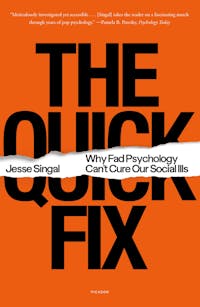The Quick Fix
Why Fad Psychology Can't Cure Our Social Ills
 Download image
Download image
ISBN10: 1250829461
ISBN13: 9781250829467
Trade Paperback
352 Pages
$20.00
CA$27.00
With their viral TED talks, bestselling books, and counter-intuitive remedies for complicated problems, psychologists and other social scientists have become the reigning thinkers of our time. Grit and “power posing” promised to help overcome entrenched inequalities in schools and the workplace; the Army spent hundreds of millions of dollars on a positive psychology intervention geared at preventing PTSD in its combat soldiers; and the implicit association test swept the nation on the strength of the claim that it can reveal unconscious biases and reduce racism in police departments and human resources departments.
But what if much of the science underlying these blockbuster ideas is dubious or fallacious? What if Americans’ longstanding preference for simplistic self-help platitudes is exerting a pernicious influence on the way behavioral science is communicated and even funded, leading respected academics and the media astray?
In The Quick Fix, Jesse Singal examines the most influential ideas of recent decades and the shaky science that supports them. He begins with the California legislator who introduced self-esteem into classrooms around the country in the 1980s and the Princeton political scientist who warned of an epidemic of youthful “superpredators” in the 1990s. In both cases, a much-touted idea had little basis in reality, but had a massive impact. Turning toward the explosive popularity of 21st-century social psychology, Singal examines the misleading appeal of entertaining lab results and critiques the idea that subtle unconscious cues shape our behavior. As he shows, today’s popular behavioral science emphasizes repairing, improving, and optimizing individuals rather than truly understanding and confronting the larger structural forces that drive social ills.
Like Anand Giridharadas’s Winners Take All, The Quick Fix is a fresh and powerful indictment of the thought leaders and influencers who cut corners as they sell the public half-baked solutions to problems that deserve more serious treatment.
Reviews
Praise for The Quick Fix
"Singal’s analysis is . . . a quick fix for readers who want to be more enlightened and thoughtful consumers of psychological science. It is also a bracing reminder that social realms in which there are Big Problems—such as crime, education and poverty—are beyond the reach of fads and quick fixes, no matter how seductive."—Sally Satel, The Wall Street Journal
"The Quick Fix is a great read, well-written in a lively style and aimed at general audiences . . . Even as a psychologist familiar with the replication crisis there are some deep dives here into a lot of important areas."—Christopher J. Ferguson, Psychology Today
"Jesse Singal is America’s best social science journalist. In this book he shows that addressing social problems is hard, there is no quick fix, and we psychologists will have to be more careful in our work and restrained in our claims. Singal focuses on social psychology, but this book is a great read for anyone who wants to understand and ameliorate social problems."—Jonathan Haidt, professor at New York University—Stern School of Business, author of The Righteous Mind, and coauthor of The Coddling of the American Mind
"Jesse Singal is one of the smartest, fairest, and most skeptical writers around. He is somehow able to delve into complex matters, give every side its due, and still render judgment. And—most amazing of all—he's an awful lot of fun to read."—Jonathan Chait, columnist at New York magazine and author of Audacity and The Big Con
"Combining dry humor with forensic research, The Quick Fix is an absorbing account of how media-friendly but largely spurious self-help ideas came to dominate our thinking about society's most complex problems. Yet it left me feeling unexpectedly inspired: once you've been disabused of the notion that changing the world might be simple, you're better equipped for the messy, reality-based challenge of actually making a difference."—Oliver Burkeman, author of The Antidote: Happiness for People Who Can't Stand Positive Thinking
"An overdue and very well-executed look at how many of the problems in social psychology run deeper than just the replication crisis. [The Quick Fix] covers topics of self-help books, posing and power, superpredators, bias tests, and much more."—Tyler Cowen, Marginal Revolution
“In order to explain the allure of fad psychology, Singal . . . presents this well-researched book that explains how half-baked behavioral science spreads . . . Readers can approach this book a chapter at a time, and overall, they will see Singal’s big picture of how ideas about self-esteem, bias tests, positive psychology, and other fads put limitations on everyone’s ability to dig deeper into these matters. This book will appeal to readers who want to understand the complexity of psychological issues.”—Jennifer Adams, Booklist
Reviews from Goodreads
BOOK EXCERPTS
Read an Excerpt
INTRODUCTION
If you’re the sort of person who buys and reads books about human behavior, then it is likely you have recently encountered an exciting, counterintuitive new psychological idea that seems as if it could help solve a pressing...



